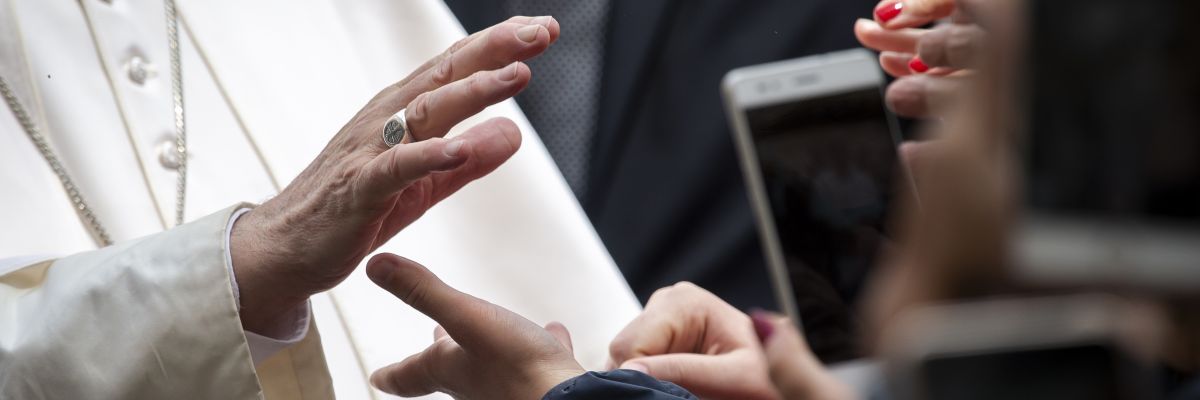
Papal infallibility is an oft-misunderstood doctrine of Catholicism, so it’s crucial that we understand it correctly. Mark Brumley explains how and when the pope is protected by the Holy Spirit from teaching error.
Transcript:
Caller: I need a better education on papal infallibility, especially as it relates to the pope’s recent comments about gay marriage. It sounds like, when he’s wearing the mitre, he’s the pope and speaks with the authority of God, but when he takes it off he can say whatever he wants. But here’s the real point to it: whatever the explanation is and has been—and I’ve been listening to you all talk about this quite a bit—it doesn’t work for my 16-year-old daughter who keeps reminding me that the pope supports gay marriage.
Mark Brumley: Even before we get to the question of infallibility, let’s clarify one point: the pope has not said he supports gay marriage. In fact, the pope has said he opposes same-sex marriage. But the recent question was whether or not he, as his own opinion, supports the idea of civil legislation that would give some of the same benefits, civil benefits, of marriage to people of the same sex who cohabitate, or even possibly people of the opposite sex who cohabitate who aren’t married, who may be brothers and sisters or some other arrangement of people; the idea being that there can be a common household recognized in civil legislation. So there’s some ambiguity as to exactly what he meant about that.
You have to be clear that this was a comment he made in an interview when he was asked a question, it had to do with civil legislation and civil unions and not specifically on same-sex marriage, so-called “gay marriage.” On that topic he has repeatedly, clearly, said marriage is between a man and a woman, it is not between two men or two women. So that’s the first point. So you could clarify with your daughter: whatever the news reports may have said about the pope supposedly supporting same-sex marriage, in fact he did not support same-sex marriage.
But with respect to infallibility, infallibility means that when the Church teaches something as true in its definitive form—when the Church says “This is definitive teaching for us,” that teaching will not be false. The Church will never teach as true—definitively true—something that’s false. Nor will the Church ever teach as definitively false something that is true when it concerns what God has revealed about what we are to believe and how we are to live.
Infallibility doesn’t have to do with who’s gonna be the winner in the presidential contest between Donald Trump and Joe Biden. It doesn’t have to do with who’s going to win the World Series next year, assuming we have a World Series. It doesn’t have to do with the question of whether or not string theory is the accurate understanding of the relationship between very small things and very big things in the universe. It has to do with what God has revealed about Himself, what He wants us to believe about Himself, and how He wants us to live. So we call that faith and morals. Infallibility has to do with definitive Church teaching concerning faith and morals.
Now the question is: who gets to exercise that infallibility? One answer to that question is: all the bishops of the Church. When they teach scattered throughout the world, when they teach concerning faith and morals that something is to be definitively held by all the faithful and they do that in agreement with one another, that teaching is protected by the Holy Spirit so that they will not teach as true what is false, they will not teach as false what’s true.
The same authority to teach infallibly exists in the bishops of the world when they’re gathered together in an ecumenical council, when they teach something definitive, something that is divinely revealed to be definitively held, or something pertaining to divine revelation to be definitively held by all the faithful.
And then when the pope, as the head of the college of bishops, teaches something in that way, it’s infallible. This is what the Catechism says in article 891: “The Roman Pontiff, head of the college of bishops, enjoys this infallibility in virtue of his office when, as supreme pastor and teacher of all the faithful—who confirms his brethren into the faith—he proclaims by a definitive act a doctrine pertaining to faith or morals.” It goes on to say: “The infallibility promised to the Church is also present in the body of bishops when, together with Peter’s successor, they exercise the supreme Magisterium,” I mentioned that earlier.
So it makes clear: the pope exercises this infallibility, as safeguarded by the Holy Spirit against teaching error, when in a definitive act he teaches something concerning faith and morals; not when he’s asked his opinion in an interview about what’s the best political arrangement, the best application of teaching in a political arrangement; not when he’s asked a question off the cuff, or he’s answering off the cuff on an airplane flight, and so on.
So very specific conditions under which the pope exercises his full authority as teacher of the faith, just as there are very specific situations, conditions, under which all the bishops exercise their authority as teachers of the faith. And I think if we keep that in mind, that will go a long way to help clarifying some of these issues we see reported in the media.



